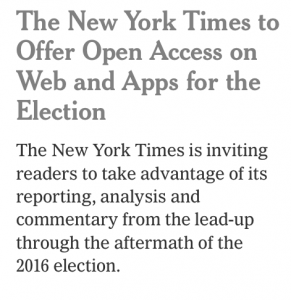I was dismayed when The New York Times put up a paywall around its online content back in 2011. I get why they did it, but I was accustomed to getting their great content without the need for a credit card, username, and password. Living in central Pennsylvania, it’s impossible to get home delivery (and trust me, I’ve tried). Several local stores and gas stations carry a handful of copies, but you have to get there early in the morning to guarantee a copy (it’s often impossible to get a copy of the Sunday paper after 10 am). An online subscription was a tough pill for me to swallow at the time, given that I didn’t have a physical artifact to hold on to, which would look nice on my coffee table and makes a great weed blocker in my gardens when I’m reading it. And as an avowed cruciverbalist, the online edition does not allow me to indulge my daily ritual. Times change (no pun intended), and I no longer have any reservations about online-only subscriptions, so I’ve been an online subscriber to the Times (plus crosswords) for awhile now.

This morning when I opened the NYTimes app on my iPad, I was greeted with this headline: “The New York Times to Offer Open Access on Web and Apps for the Election.” What caught my attention more than the fact that they’re offering free access was the way they phrased it: they used the term Open Access. They could have said “free,” “non-paywalled,” “complimentary,” etc., but they made a conscious decision to call it OA. I wish they used the phrase in the article itself to help contextualize my understanding of their rationale for using that term, but it appears only in the headline.
As an advocate for OA scholarship, I think I’m glad to see the term appear on the New York Times‘s homepage. My hesitancy here is that it’s not truly OA. The content is gratis, but certainly not libre. And when the clock strikes midnight on Thursday, all of the journalism that was freely available will once again be cloistered behind the paywall. Me being the eternal optimist, I’m seeing the glass half full here: non-subscribers will have free access for a period of time, and the phrase Open Access gets some big-time exposure, which will hopefully advance the cause. OA is really a paradigm shift, so making people aware of its existence and what it is and why it’s necessary is really the only way to get that pendulum swinging.